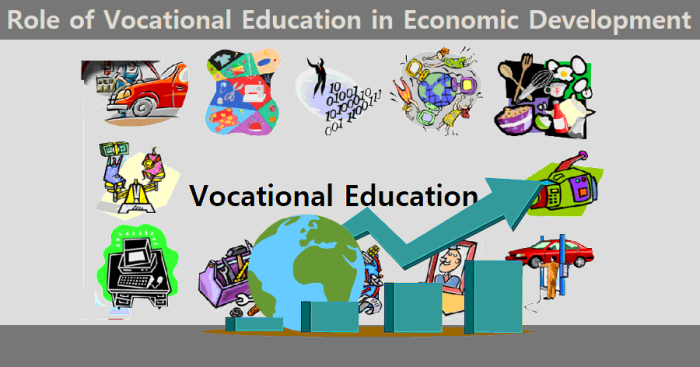
Embark on a journey through The future of vocational trade schools in a changing economy, where we explore the dynamic landscape shaped by technological progress and shifting economic needs. Discover how these schools are innovating to bridge the skills gap and meet the challenges of tomorrow.
Uncover the key insights into how vocational trade schools are adapting to ensure students are equipped for success in a rapidly changing world.
The Future of Vocational Trade Schools in a Changing Economy
Vocational trade schools play a crucial role in preparing individuals for skilled professions in various industries. As the economy continues to evolve, these schools must adapt to meet the changing demands of the workforce. Technological advancements have a significant impact on the way vocational trade schools operate, requiring them to incorporate new training methods and curriculum to stay relevant.
Impact of Technological Advancements on Vocational Trade Schools
With the rapid pace of technological advancements, vocational trade schools are embracing new tools and techniques to enhance the learning experience for students. Incorporating virtual reality simulations, online learning platforms, and hands-on training with cutting-edge equipment are becoming more common in vocational programs. This shift not only prepares students for the modern workplace but also ensures they are equipped with the latest skills and knowledge required by employers.
Adaptation of Vocational Trade Schools to Meet Changing Demands
To meet the changing demands of the economy, vocational trade schools are expanding their program offerings to include training in emerging fields such as cybersecurity, renewable energy, and healthcare technology. By collaborating with industry partners and experts, these schools can tailor their curriculum to align with current market needs. Additionally, offering flexible scheduling options and career placement services helps students transition smoothly into the workforce upon graduation.
Role of Vocational Trade Schools in Bridging the Skills Gap
One of the primary functions of vocational trade schools is to bridge the skills gap in the workforce by providing specialized training in high-demand industries. By focusing on practical skills and hands-on experience, these schools produce graduates who are ready to enter the job market with relevant expertise. Through internships, apprenticeships, and industry certifications, vocational trade schools ensure that their students are well-prepared to meet the needs of employers and contribute effectively to the economy.
Vocational Trade Schools
Attending a vocational trade school offers numerous benefits to students looking to enter the workforce quickly and efficiently. These schools focus on providing hands-on training and practical skills that are directly applicable to various industries, making graduates highly employable.
When comparing the curriculum structure of vocational trade schools with traditional educational institutions, one can see a more specialized and career-focused approach in vocational schools. While traditional colleges and universities offer a broad range of subjects, vocational trade schools concentrate on specific trades, allowing students to gain in-depth knowledge and expertise in their chosen field.
Examples of Successful Vocational Trade School Graduates and Their Career Paths
- Mike Rowe – After attending a vocational trade school for welding, Mike Rowe went on to host the popular TV show “Dirty Jobs” and became a prominent advocate for skilled trades.
- Lisa Davis – Lisa graduated from a vocational trade school for cosmetology and now owns her successful salon, where she specializes in hair and makeup services for weddings and special events.
- John Smith – John completed a program in automotive technology at a vocational trade school and now works as a certified mechanic at a renowned car dealership, where he continues to advance his skills and knowledge in the field.
Travel and Leisure
Traveling on a budget can be especially important for students attending vocational trade schools. Not only does it allow for a break from the rigors of studying and training, but it can also provide valuable experiences that can enhance vocational skills.
Budget Travel Tips for Students
- Look for student discounts on transportation and accommodation.
- Consider alternative accommodations like hostels or Airbnb.
- Plan your meals by cooking in hostels or finding affordable local eateries.
- Utilize public transportation or bike rentals instead of expensive taxis.
- Take advantage of free or discounted attractions like museums, parks, and walking tours.
Importance of Travel Experiences in Enhancing Vocational Skills
Traveling exposes students to different cultures, languages, and ways of life, which can broaden their perspectives and enhance their problem-solving and communication skills. These experiences can help students develop adaptability, resilience, and creativity, which are valuable traits in any vocational field.
Incorporating Travel and Leisure into Vocational Trade School Programs
- Organize study trips to industries related to students’ vocational fields to provide real-world exposure.
- Include cultural immersion activities to promote understanding and appreciation of diversity.
- Offer language courses or workshops to enhance communication skills in multicultural environments.
- Encourage students to participate in volunteer programs or internships abroad to gain practical experience.
Adventure Travel
Adventure travel is not just about exploring new destinations, but it also has a profound impact on personal growth and skill development. It challenges individuals to step out of their comfort zones, learn new things, and adapt to unfamiliar situations, leading to valuable experiences that can shape their character and enhance their skills.
Impact on Personal Growth and Skill Development
Adventure travel pushes individuals to face challenges, overcome obstacles, and develop important life skills such as problem-solving, decision-making, teamwork, and adaptability. It fosters personal growth by building confidence, resilience, and a sense of independence. These experiences help individuals become more well-rounded and capable of handling various situations in both their personal and professional lives.
Benefits for Students in Vocational Trade Schools vs. Traditional Universities
Adventure travel can be particularly beneficial for students in vocational trade schools compared to those in traditional universities. Vocational trade school students often have hands-on training and practical skills development as part of their curriculum. Adventure travel complements this by providing real-world experiences that enhance their technical skills and broaden their perspectives. On the other hand, traditional university students may focus more on theoretical knowledge, making adventure travel a valuable opportunity to apply their learning in real-life situations and gain practical skills.
Examples of Adventure Travel Experiences for Vocational Trade School Students
- Participating in volunteer programs abroad to learn about different cultures and contribute to community development projects.
- Completing internships or work-study programs in foreign countries to gain practical experience in their field of study while immersing themselves in a new environment.
- Engaging in outdoor expeditions such as hiking, camping, or rock climbing to build teamwork, leadership, and problem-solving skills in challenging environments.
Airline Travel
Airline travel plays a crucial role in connecting vocational trade school students to global opportunities. It provides students with the ability to travel internationally for job placements, internships, or specialized training programs.
Collaboration with Airlines
Vocational trade schools can collaborate with airlines to offer unique learning experiences to their students. This collaboration can involve internships at airline companies, specialized training programs in aviation-related fields, or even joint projects that combine academic learning with practical industry experience.
Future Trends of Airline Travel
- Increasing Automation: With advancements in technology, the airline industry is moving towards more automated processes, which may impact the skill sets required by vocational trade school graduates entering this field.
- Sustainability Initiatives: Airlines are investing in sustainable practices to reduce their carbon footprint. Vocational trade schools can adapt their curriculum to include courses on environmental sustainability to prepare students for careers in eco-friendly aviation.
- Global Connectivity: As airline routes continue to expand, vocational trade school students have more opportunities to work in diverse locations around the world. Schools can focus on cultural competency training to better prepare students for international work environments.
Budget Travel
Traveling on a budget is essential for vocational trade school students who want to explore the world without breaking the bank. Developing budget travel skills not only allows students to satisfy their wanderlust but also helps them in their future careers by teaching them financial responsibility.
Guide on Planning Budget-Friendly Travel Experiences
- Start by setting a realistic travel budget that includes all expenses such as transportation, accommodation, meals, and activities.
- Look for budget-friendly accommodation options like hostels, guesthouses, or Airbnb instead of expensive hotels.
- Utilize student discounts and travel deals to save money on transportation and attractions.
- Consider traveling during the off-peak season to take advantage of lower prices and fewer crowds.
- Plan your itinerary in advance to avoid last-minute expenses and make the most out of your trip.
Affordable Travel Destinations for Vocational Trade School Students
- Thailand: Known for its beautiful beaches, delicious street food, and affordable prices, Thailand is a popular destination for budget travelers.
- Portugal: With its stunning landscapes, rich history, and budget-friendly accommodation options, Portugal is a great choice for students on a budget.
- Costa Rica: Perfect for nature lovers, Costa Rica offers affordable eco-friendly accommodations, outdoor activities, and breathtaking scenery.
- Vietnam: From bustling cities to serene landscapes, Vietnam is a budget-friendly destination with delicious food, cheap transportation, and unique cultural experiences.
- Eastern Europe: Countries like Hungary, Poland, and Czech Republic offer affordable travel options, including accommodations, food, and transportation.
Camping
Camping experiences offer vocational trade school students numerous benefits beyond the classroom. It provides a unique opportunity for students to disconnect from technology, connect with nature, and develop essential life skills in a hands-on setting.
Benefits of Camping for Vocational Trade School Students
- Improved Problem-Solving Skills: Camping challenges students to think on their feet, adapt to unexpected situations, and come up with creative solutions.
- Enhanced Teamwork: Working together to set up camp, cook meals, and navigate outdoor activities fosters collaboration and communication among students.
- Stress Relief: Spending time in nature can reduce stress levels, improve mental health, and promote overall well-being, benefiting students both academically and personally.
Incorporating Camping Activities into Vocational Trade School Programs
- Organize Camping Trips: Plan weekend camping trips to nearby natural areas where students can engage in outdoor activities and team-building exercises.
- Create Outdoor Skills Workshops: Offer workshops on essential camping skills such as setting up tents, building fires, and navigating using a map and compass.
- Integrate Environmental Education: Teach students about the importance of conservation, sustainability, and Leave No Trace principles during camping experiences.
Enhancing Teamwork and Problem-Solving Skills through Camping
Camping inherently requires students to work together to overcome challenges and obstacles. From pitching tents to cooking meals over a campfire, students must communicate effectively, delegate tasks, and problem-solve in real-time. These experiences help students develop crucial skills that are transferable to their future careers and personal lives.
Car Rentals
Car rentals play a crucial role in facilitating travel for vocational trade school students. Whether it’s for educational field trips or practical training, renting a car provides students with the flexibility and convenience they need to navigate different locations efficiently.
Benefits of Renting Cars for Vocational Trade School Students
- Independence: Renting a car gives students the freedom to explore various destinations on their own schedule, without having to rely on public transportation.
- Cost-Effective: Splitting the cost of a rental car among a group of students can often be more budget-friendly than other transportation options.
- Accessibility: Car rentals allow students to access remote or off-the-beaten-path locations that may not be easily reachable by public transport.
- Convenience: Having a car at their disposal makes it easier for students to transport equipment or materials needed for their vocational training.
Tips for Finding the Best Car Rental Deals
- Book in Advance: Planning ahead and booking a rental car early can often result in better rates.
- Compare Prices: Utilize online platforms to compare prices from different car rental companies to find the most competitive deal.
- Look for Discounts: Check for student discounts or promotional offers that may be available to vocational trade school students.
- Consider Membership Programs: Joining car rental loyalty programs or memberships can often lead to discounts and perks for frequent renters.
City Guides and Information
Exploring different cities can provide vocational trade school students with valuable cultural enrichment and potential career opportunities. Leveraging city information can offer educational benefits and enhance their overall learning experience.
Recommendations on City Guides and Resources
- Utilize websites like TripAdvisor or Lonely Planet for comprehensive city guides.
- Check out local tourism websites for information on attractions, events, and cultural sites.
- Visit city-specific blogs or forums to get insider tips and recommendations from locals.
Importance of Exploring Different Cities
- Experiencing diverse cultures can broaden students’ perspectives and enhance their understanding of global industries.
- Networking opportunities in different cities can lead to internships, job placements, or collaborations in various vocational fields.
- Learning about city-specific industries can help students tailor their education and training to meet local demands and opportunities.
Leveraging City Information for Educational Purposes
- Organize field trips to nearby cities to provide hands-on learning experiences for students.
- Invite guest speakers from different cities to share insights on industry trends and opportunities.
- Incorporate city-specific case studies into vocational training programs to make learning more relevant and practical.
Cruise Ship Reviews
Taking vocational trade school students on a cruise can provide a unique and enriching travel experience that goes beyond traditional classroom learning. Here are some benefits of cruise ship travel for vocational trade school students:
Benefits of Cruise Ship Travel for Vocational Trade School Students
- Exposure to different cultures and customs: Cruise ships visit multiple destinations, allowing students to immerse themselves in diverse cultures and broaden their understanding of the world.
- Hands-on experience in hospitality and tourism: Students can gain practical experience in customer service, event planning, and other skills relevant to the hospitality industry while on board a cruise ship.
- Networking opportunities: Interacting with passengers and crew members from around the world can help students build valuable connections for their future careers.
How Cruise Ship Experiences Complement Vocational Training in Hospitality and Tourism
- Real-world application: Students can apply the knowledge and skills they have learned in the classroom to real-life situations on a cruise ship, reinforcing their vocational training.
- Understanding guest experience: Working in a cruise ship environment can help students understand the importance of customer satisfaction and service excellence in the hospitality and tourism industry.
- Teamwork and collaboration: Cruise ship experiences encourage students to work together in a fast-paced, dynamic environment, preparing them for the teamwork required in the industry.
Tips on Selecting the Right Cruise Ship for Educational Purposes
- Research cruise lines: Look for cruise lines that offer educational programs or partnerships with vocational schools to enhance the learning experience.
- Consider the itinerary: Choose a cruise that visits destinations relevant to the students’ vocational training, such as popular tourist destinations or cultural hubs.
- Review onboard facilities: Check if the cruise ship has amenities like lecture halls, workshops, or hands-on training areas that can support the educational objectives of the trip.
Destination Tips
When planning educational trips as vocational trade school students, it is essential to consider destination tips that can enhance your overall learning experience and cultural immersion. By exploring new places and engaging with different cultures, you can broaden your perspective and develop valuable vocational skills that can benefit your future career.
Importance of Cultural Immersion
Cultural immersion plays a crucial role in the development of vocational skills as it allows students to understand diverse perspectives, traditions, and practices. By immersing yourself in the local culture of your chosen destination, you can gain valuable insights that can enhance your vocational training. Participating in cultural activities, trying local cuisine, and interacting with residents can provide a deeper understanding of the trade you are studying.
Making the Most of Educational Travel Experiences
To make the most of your educational travel experiences, it is important to plan ahead and set specific learning goals for your trip. Research the destination beforehand to identify key vocational opportunities, such as workshops, internships, or industry visits. Engage with local professionals and experts to gain practical insights and hands-on experience in your field of study. Additionally, take the time to explore the cultural heritage of the destination and participate in activities that can broaden your knowledge and skills.
First Time Cruising
Embarking on your first cruise can be an exciting and memorable experience, especially for vocational trade school students looking to unwind and explore new destinations. Here is a guide to help you make the most of your first-time cruising adventure.
What to Expect and How to Prepare
- Research the cruise line: Look into the amenities, dining options, and onboard activities offered by the cruise line to ensure it aligns with your preferences.
- Pack wisely: Make sure to pack comfortable clothing, swimwear, sunscreen, and any necessary travel documents for a smooth sailing experience.
- Stay organized: Keep important documents like your passport, boarding pass, and any medications in a secure and easily accessible place.
- Explore the ship: Take the time to familiarize yourself with the layout of the ship, including dining areas, entertainment venues, and recreational facilities.
Learning Opportunities During Your Cruise
Embarking on a cruise can offer vocational trade school students the chance to enhance their skills in customer service, hospitality, event planning, and teamwork.
- Participate in onboard workshops and classes: Many cruises offer workshops and classes on various topics, providing valuable learning opportunities for students interested in expanding their skill set.
- Engage with staff and crew: Interacting with the ship’s staff and crew members can offer insights into the hospitality industry and provide networking opportunities for future career endeavors.
- Volunteer for onboard activities: Getting involved in onboard activities such as group games, talent shows, or themed events can help students develop teamwork and communication skills in a fun and engaging setting.
Golf Travel and Resorts
When it comes to vocational trade school students pursuing careers in hospitality and event management, golf travel can offer a range of benefits. Not only does it provide a unique learning experience, but it also allows students to combine their passion for golf with vocational training, resulting in a well-rounded educational experience.
Benefits of Golf Travel for Vocational Trade School Students
- Golf travel offers students the opportunity to network with industry professionals in a relaxed setting, fostering valuable connections for future career opportunities.
- Students can gain hands-on experience in event management by organizing golf tournaments or corporate events at golf resorts, enhancing their practical skills.
- Working at golf resorts can provide students with exposure to high-end clientele and customer service, preparing them for the demands of the hospitality industry.
Unique Learning Experiences at Golf Resorts
- Students can learn about golf course management, maintenance, and operations, gaining insight into the behind-the-scenes workings of a golf resort.
- Participating in golf clinics and lessons can help students improve their own golf skills while learning from experienced professionals in the industry.
- Internship opportunities at golf resorts can offer students hands-on experience in various departments, from food and beverage to marketing and sales.
Tips for Combining Golf Travel with Vocational Training
- Look for vocational programs that offer specialized courses in golf management or event planning to complement your golf travel experiences.
- Consider joining golf clubs or associations to expand your network and stay informed about industry trends and opportunities.
- Seek out scholarships or sponsorships from golf resorts or industry organizations to support your educational and travel expenses.
Hiking Backpacking
Outdoor activities like hiking and backpacking offer numerous benefits for vocational trade school students. These adventures provide a break from the traditional classroom setting, allowing students to connect with nature, build teamwork skills, and develop physical fitness.
Benefits of Hiking and Backpacking
- Enhanced problem-solving skills: Hiking and backpacking require students to navigate trails, read maps, and make decisions on the go, fostering quick thinking and adaptability.
- Improved resilience: Facing challenges such as steep terrains or adverse weather conditions during hiking trips can help students develop resilience and perseverance, valuable traits in vocational training.
- Physical fitness: Engaging in outdoor activities like hiking and backpacking promotes physical health and well-being, contributing to overall student wellness.
Incorporating Hiking and Backpacking into Vocational Trade School Programs
- Organize field trips to nearby hiking trails or national parks to introduce students to outdoor activities and encourage exploration.
- Offer outdoor adventure electives that focus on hiking, backpacking, and wilderness survival skills to provide hands-on learning experiences.
- Collaborate with outdoor education centers or experts to design specialized programs that combine vocational training with outdoor adventures.
Hotels Accommodations
Hotel accommodations play a crucial role in providing practical training opportunities for vocational trade school students pursuing careers in hospitality and tourism. These real-world experiences are essential for students to develop the necessary skills and knowledge needed to succeed in the industry.
Role of Hotel Accommodations in Vocational Trade Schools
- Hands-on experience in hotel settings allows students to apply theoretical knowledge in practical scenarios, enhancing their understanding of the industry.
- Working in hotels provides students with exposure to different departments such as front desk operations, housekeeping, food and beverage, and management, preparing them for diverse roles in the field.
- Internships and learning experiences in hotels give students the opportunity to interact with guests, handle customer service situations, and develop communication and problem-solving skills.
Partnerships with Hotels for Student Internships
- Vocational trade schools can partner with hotels to offer internships, externships, and apprenticeships to students, providing them with valuable industry experience.
- Hotels benefit from these partnerships by gaining access to a pool of talented and motivated students who can contribute to their operations while learning on the job.
- Collaborating with hotels also allows vocational trade schools to stay updated on industry trends, best practices, and technological advancements, ensuring that their curriculum remains relevant and up-to-date.
Limo Rentals Limousines
Limousine rentals play a crucial role in adding a touch of luxury and convenience to special events and corporate travel for vocational trade school students. Whether it’s prom night celebrations or networking events, arriving in a limo can make a lasting impression.
Enhancing Travel Experience
When attending vocational programs, students can enhance their overall travel experience by opting for limo rentals. Not only does it provide a comfortable and stylish mode of transportation, but it also allows students to travel in groups, making the journey more enjoyable and memorable.
Booking Tips for Educational Field Trips
- Plan in advance: Make sure to book the limo rental well ahead of time to secure availability, especially for peak seasons or popular events.
- Specify the details: Provide the limo rental company with specific information about the field trip, including the number of students, pick-up and drop-off locations, and any special requests.
- Check for discounts: Some limo rental companies offer discounts for educational purposes, so be sure to inquire about any available deals or packages.
- Ask about amenities: Inquire about the amenities included in the limo, such as Wi-Fi, refreshments, and entertainment options, to ensure a comfortable and enjoyable ride for the students.
Booking Tips for Networking Events
- Select the right vehicle: Choose a limo that suits the size of your group and the nature of the event, whether it’s a sleek sedan for a small group or a stretch limo for a larger gathering.
- Coordinate with the limo company: Communicate with the limo rental company to arrange for timely pick-up and drop-off, ensuring that students arrive at the networking event punctually and in style.
- Create a schedule: Plan out the itinerary for the networking event and share it with the limo driver to ensure a smooth and efficient transportation experience for the students.
Luxury Cruising
Luxury cruising offers unique educational opportunities for vocational trade school students by providing hands-on experience in high-end hospitality and tourism. This type of travel allows students to gain insight into the luxury travel industry and learn firsthand from experienced professionals onboard.
Benefits of Luxury Cruising for Vocational Trade School Students
- Exposure to High-End Hospitality: Luxury cruising exposes students to the high standards of service and luxury amenities found in the hospitality industry.
- Networking Opportunities: Students have the chance to network with industry professionals and potential employers while onboard a luxury cruise.
- Cultural Immersion: Luxury cruises often visit exotic destinations, allowing students to immerse themselves in different cultures and customs.
- Hands-On Experience: Students can gain practical experience by participating in onboard activities and observing the operations of a luxury cruise ship.
- Inspiration for Excellence: Experiencing luxury travel can inspire students to strive for excellence in their future careers in hospitality and tourism.
Ski Resorts

When it comes to vocational trade school students, ski resorts offer a unique and valuable experience that goes beyond traditional classroom learning. These resorts provide hands-on opportunities for students to apply their skills in real-world settings, especially in programs related to hospitality and event management.
Benefits of Ski Resort Experiences for Vocational Trade School Students
- Exposure to customer service: Working at a ski resort allows students to interact with guests and develop customer service skills, which are essential in various vocational fields.
- Teamwork and collaboration: Students can learn the importance of teamwork by working with colleagues to ensure the smooth operation of the resort.
- Time management skills: Balancing work responsibilities with recreational activities at a ski resort can help students improve their time management abilities.
Hands-On Learning Opportunities in Hospitality and Event Management Programs
- Event planning: Students can assist in organizing and executing events at the resort, gaining practical experience in event management.
- Food and beverage service: Working in restaurants or cafes at the resort allows students to hone their skills in food service and customer satisfaction.
- Accommodation management: Students can learn about the day-to-day operations of lodging facilities within the resort, providing insight into hospitality management.
Tips for Combining Ski Resort Visits with Vocational Training
- Look for internship opportunities: Seek out internships at ski resorts to gain hands-on experience in your field of study while enjoying the resort amenities.
- Attend workshops and seminars: Participate in workshops or seminars offered by the resort to enhance your knowledge and skills in hospitality and event management.
- Network with industry professionals: Take advantage of networking opportunities at the resort to connect with professionals who can provide guidance and mentorship in your vocational career.
Staycations
Staycations have become a popular choice for vocational trade school students looking to explore their local surroundings while taking a break from their studies. This cost-effective and convenient option allows students to relax and rejuvenate without the need for extensive travel.
Benefits of Staycations
- Staycations promote local tourism by supporting small businesses and attractions in the community.
- Students can develop a deeper appreciation for their own city or region, fostering cultural awareness and understanding.
- It allows for more flexibility in scheduling and budgeting, making it an ideal choice for students on a tight schedule or limited budget.
Planning Educational Staycations
- Research local museums, historical sites, and cultural events to incorporate educational elements into the staycation.
- Consider volunteering opportunities or workshops related to vocational skills to make the staycation both fun and enriching.
- Create a budget and itinerary to ensure that the staycation is well-organized and maximizes the student’s time off.
Travel Planning
Travel planning is a crucial aspect for vocational trade school students who wish to explore new destinations while balancing their educational commitments. It involves efficient time management and budgeting skills to ensure a smooth and rewarding travel experience.
Step-by-step Guide on Effective Travel Planning
- Start by setting clear travel goals and objectives, considering your educational schedule and budget constraints.
- Research destinations that align with your interests and offer educational value, such as vocational training workshops or industry-related events.
- Create a detailed itinerary outlining travel dates, accommodation options, transportation arrangements, and activities to maximize your experience.
- Make reservations in advance to secure the best deals on flights, accommodations, and any educational tours or workshops you plan to attend.
- Pack smartly, considering the activities you will engage in during your trip and any vocational tools or materials you may need to carry with you.
Importance of Time Management and Budgeting Skills in Travel Planning for Educational Purposes
Effective time management ensures that vocational trade school students can balance their academic responsibilities with their travel plans. By allocating specific time slots for studying, attending classes, and exploring new destinations, students can make the most of their educational travel experiences without compromising their learning objectives.
Budgeting skills play a crucial role in travel planning, allowing students to estimate the costs associated with transportation, accommodation, meals, and activities. By setting a realistic budget and sticking to it, students can enjoy enriching travel experiences without overspending or accumulating unnecessary debt.
Recommendations on Tools and Resources for Efficient Travel Planning Tailored to Vocational Training Needs
- Utilize online travel platforms and apps to compare prices, book accommodations, and find educational workshops or events relevant to your vocational training.
- Join student travel groups or forums to exchange tips, recommendations, and experiences with fellow vocational trade school students who share similar interests in educational travel.
- Consider seeking guidance from academic advisors or vocational instructors who may provide valuable insights on integrating travel experiences with your educational goals.
- Explore scholarship opportunities or funding options specifically designed for vocational trade school students interested in educational travel, helping to reduce financial barriers and make travel more accessible.
Vacation Homes
When it comes to vocational trade school students seeking unique travel experiences, vacation homes can offer a whole new perspective on hospitality and accommodation management. Renting vacation homes for educational purposes can provide valuable insights and skill enhancement opportunities.
Benefits of Vacation Homes for Vocational Trade School Students
- Opportunity to immerse in local culture and lifestyle
- Hands-on experience in property management and guest services
- Cost-effective alternative to traditional accommodation options
Exploring Hospitality and Accommodation Management Through Vacation Homes
- Learning about property maintenance and housekeeping
- Understanding guest satisfaction and feedback management
- Gaining insights into marketing and promoting vacation rental properties
Tips for Renting Vacation Homes for Educational Purposes
- Research different vacation rental platforms for a variety of options
- Check reviews and ratings from previous guests for credibility
- Communicate with property owners to clarify any doubts or special requirements
Vacation Rentals

Vacation rentals have become increasingly popular among travelers, offering a unique and immersive experience compared to traditional accommodation options. For vocational trade school students, vacation rentals present a valuable opportunity to enhance their educational travel experiences.
Benefits of Vacation Rentals for Educational Travel
- Experiential Learning: Staying in a vacation rental allows students to immerse themselves in the local culture and lifestyle, providing a hands-on learning experience outside the classroom.
- Cultural Immersion: By living in a residential neighborhood or community, students can interact with locals, try authentic cuisine, and gain a deeper understanding of the destination’s traditions and customs.
- Cost-Effective: Vacation rentals often offer more space and amenities than traditional hotels at a comparable or lower cost, making them a budget-friendly option for group travel.
- Flexibility: Students can choose a vacation rental that suits their needs, whether it’s a cozy apartment in the city center or a charming cottage in the countryside, providing flexibility in accommodation choices.
Tips for Selecting Suitable Vacation Rentals
- Location: Consider the proximity of the vacation rental to educational sites, public transportation, and amenities to maximize the learning experience.
- Amenities: Look for vacation rentals with essential amenities such as kitchen facilities, Wi-Fi, and laundry services to ensure a comfortable stay during educational travel.
- Reviews: Read reviews from previous guests to gauge the quality of the vacation rental, cleanliness, and responsiveness of the host, ensuring a positive experience for students.
- Host Communication: Communicate with the host before booking to clarify any questions, discuss special requirements, and establish a rapport for a smooth check-in process.
In conclusion, The future of vocational trade schools in a changing economy presents a tapestry of opportunities and challenges. As these schools continue to evolve, they play a vital role in preparing individuals for the workforce of the future, where adaptability and specialized skills are paramount.
Question & Answer Hub
How are vocational trade schools incorporating technology into their programs?
Vocational trade schools are integrating cutting-edge technology like virtual reality and simulation tools to enhance hands-on learning experiences and better prepare students for modern workplaces.
What sets vocational trade schools apart from traditional educational institutions?
Vocational trade schools focus on practical skills training relevant to specific industries, offering a more direct path to employment compared to the broader education provided by traditional institutions.
Are there opportunities for travel and leisure in vocational trade school programs?
Some vocational trade schools include travel and leisure components in their curriculum to broaden students’ horizons and provide real-world experiences related to their field of study.





